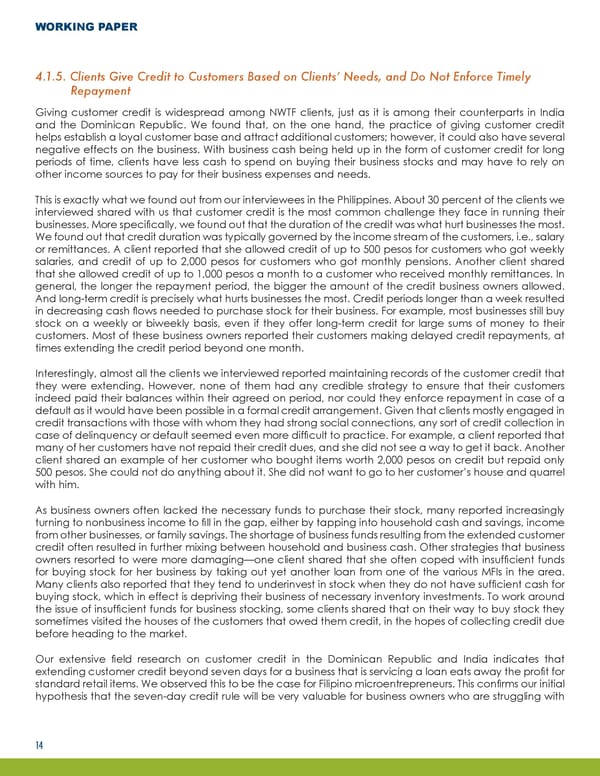WORKING PAPER 4.1.5. Clients Give Credit to Customers Based on Clients’ Needs, and Do Not Enforce Timely Repayment Giving customer credit is widespread among NWTF clients, just as it is among their counterparts in India and the Dominican Republic. We found that, on the one hand, the practice of giving customer credit helps establish a loyal customer base and attract additional customers; however, it could also have several negative effects on the business. With business cash being held up in the form of customer credit for long periods of time, clients have less cash to spend on buying their business stocks and may have to rely on other income sources to pay for their business expenses and needs. This is exactly what we found out from our interviewees in the Philippines. About 30 percent of the clients we interviewed shared with us that customer credit is the most common challenge they face in running their businesses. More specifically, we found out that the duration of the credit was what hurt businesses the most. We found out that credit duration was typically governed by the income stream of the customers, i.e., salary or remittances. A client reported that she allowed credit of up to 500 pesos for customers who got weekly salaries, and credit of up to 2,000 pesos for customers who got monthly pensions. Another client shared that she allowed credit of up to 1,000 pesos a month to a customer who received monthly remittances. In general, the longer the repayment period, the bigger the amount of the credit business owners allowed. And long-term credit is precisely what hurts businesses the most. Credit periods longer than a week resulted in decreasing cash flows needed to purchase stock for their business. For example, most businesses still buy stock on a weekly or biweekly basis, even if they offer long-term credit for large sums of money to their customers. Most of these business owners reported their customers making delayed credit repayments, at times extending the credit period beyond one month. Interestingly, almost all the clients we interviewed reported maintaining records of the customer credit that they were extending. However, none of them had any credible strategy to ensure that their customers indeed paid their balances within their agreed on period, nor could they enforce repayment in case of a default as it would have been possible in a formal credit arrangement. Given that clients mostly engaged in credit transactions with those with whom they had strong social connections, any sort of credit collection in case of delinquency or default seemed even more difficult to practice. For example, a client reported that many of her customers have not repaid their credit dues, and she did not see a way to get it back. Another client shared an example of her customer who bought items worth 2,000 pesos on credit but repaid only 500 pesos. She could not do anything about it. She did not want to go to her customer’s house and quarrel with him. As business owners often lacked the necessary funds to purchase their stock, many reported increasingly turning to nonbusiness income to fill in the gap, either by tapping into household cash and savings, income from other businesses, or family savings. The shortage of business funds resulting from the extended customer credit often resulted in further mixing between household and business cash. Other strategies that business owners resorted to were more damaging—one client shared that she often coped with insufficient funds for buying stock for her business by taking out yet another loan from one of the various MFIs in the area. Many clients also reported that they tend to underinvest in stock when they do not have sufficient cash for buying stock, which in effect is depriving their business of necessary inventory investments. To work around the issue of insufficient funds for business stocking, some clients shared that on their way to buy stock they sometimes visited the houses of the customers that owed them credit, in the hopes of collecting credit due before heading to the market. Our extensive field research on customer credit in the Dominican Republic and India indicates that extending customer credit beyond seven days for a business that is servicing a loan eats away the profit for standard retail items. We observed this to be the case for Filipino microentrepreneurs. This confirms our initial hypothesis that the seven-day credit rule will be very valuable for business owners who are struggling with 14
 Using Behavioral Science to Design a Customer-Centric Financial Management Training for Microentrepreneurs Page 16 Page 18
Using Behavioral Science to Design a Customer-Centric Financial Management Training for Microentrepreneurs Page 16 Page 18